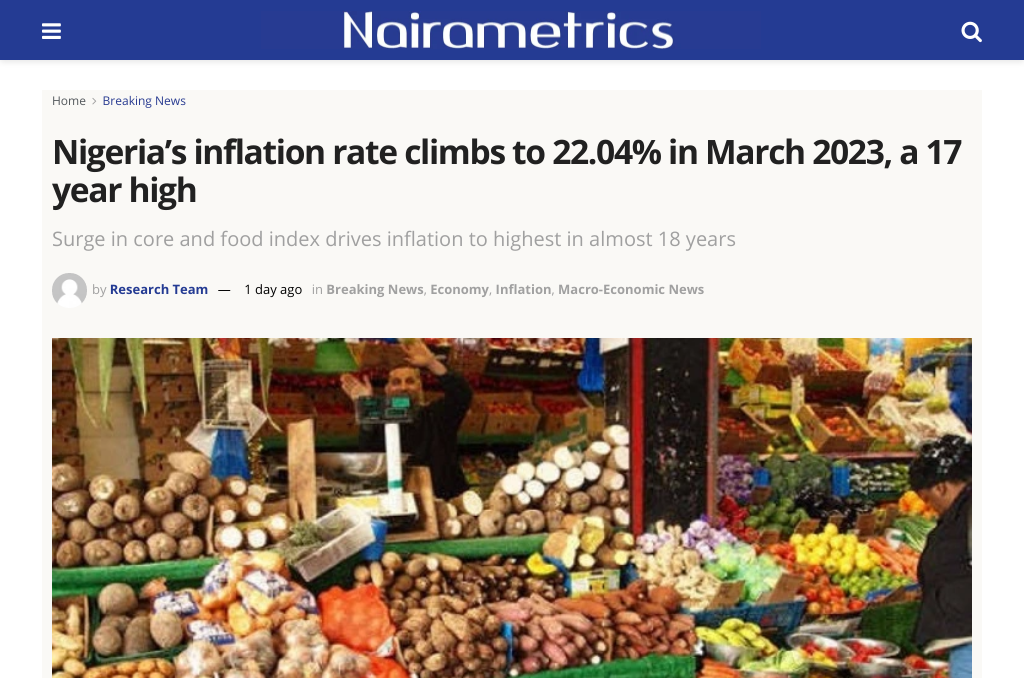Inflation continues to be a major concern for Nigeria and Argentina, as both countries saw significant increases in their inflation rates in March 2023. Nigeria’s headline inflation rate increased to 22.04% on a year-on-year basis, which is the highest rate since September 2005.[0] The food inflation rate in March 2023 also rose to 24.45%, compared to 17.20% in March 2022. Meanwhile, Argentina’s annual consumer inflation reached a new record of 104.3% in March, the highest level for the South American country since the early 1990s.[1]
In Nigeria, the National Bureau of Statistics (NBS) reported that the food inflation rate increased by 0.16% in March 2023 compared to February 2023, reaching 2.07%. The average annual rate of food inflation for the 12 months ending in March 2023 was 22.72%, which is 3.50% higher than the average annual rate of change recorded in March 2022. The NBS attributed the rise in food inflation to increases in prices of oil and fat, bread and cereals, potatoes, yam and other tubers, fish, fruits, meat, vegetables, and spirits. The contributions of items on the divisional level to the increase in the headline index include food and non-alcoholic beverages, housing, water, electricity, gas, and other fuel, clothing and footwear, transport, furnishings, household equipment and maintenance, education, health, miscellaneous goods and services, restaurant and hotels, alcoholic beverage, tobacco and kola, recreation and culture, and communication.[0]
Argentina’s inflation rate was driven by seasonal factors, a historic drought, and government overspending. In March 2023, the annual consumer inflation rate reached a new record of 104.3%, an increase from 102.5% in February 2023.[2] The increase in the food index was mainly caused by the escalation of prices for oil and fat, bread and cereal products, potatoes, yams and other tubers, fish, fruits, meat, vegetables and alcoholic beverages. The cost of education saw the highest increase and the biggest influence on the index, with a 29.1% monthly inflation rate.[3]
To counter rising inflation, Argentina’s central bank increased its benchmark interest rate by 300 basis points to 78% on March 16, the first rate increase since September 2020.[4] Nigeria’s central bank also increased its benchmark monetary policy rate to 18% in February 2023.[5] However, it remains to be seen if these measures will be effective in the long term in stabilizing the economies and controlling inflation.[2]
0. “Inflation surges to 18-year high as March records 22.04%” Daily Trust, 15 Apr. 2023, https://dailytrust.com/inflation-surges-to-18-year-high-as-march-records-22-04
1. “Why Argentina’s Inflation Is Up Over 100% Again” The Washington Post, 12 Apr. 2023, https://www.washingtonpost.com/business/2023/04/12/why-70-inflation-is-just-one-of-argentina-s-problems-quicktake/c647b234-d942-11ed-aebd-3fd2ac4c460a_story.html
2. “Argentina Records Highest Inflation Rate Since the Early 199…” MENAFN.COM, 16 Apr. 2023, https://menafn.com/1106019208/Argentina-Records-Highest-Inflation-Rate-Since-the-Early-1990s
3. “Argentina’s runaway inflation skyrockets 104.3%” eTurboNews | eTN, 15 Apr. 2023, https://eturbonews.com/argentinas-runaway-inflation-skyrockets-104-3/
4. “Argentina to Hold Benchmark Rate Despite March Inflation Fears” Yahoo Canada Finance, 12 Apr. 2023, https://ca.finance.yahoo.com/news/argentina-hold-benchmark-rate-despite-214934642.html
5. “Nigeria’s inflation rate climbs to 22.04% in March 2023, a 17 year high” Nairametrics, 15 Apr. 2023, https://nairametrics.com/2023/04/15/breaking-nigerias-inflation-rate-climbs-to-22-04-in-march-2023/
